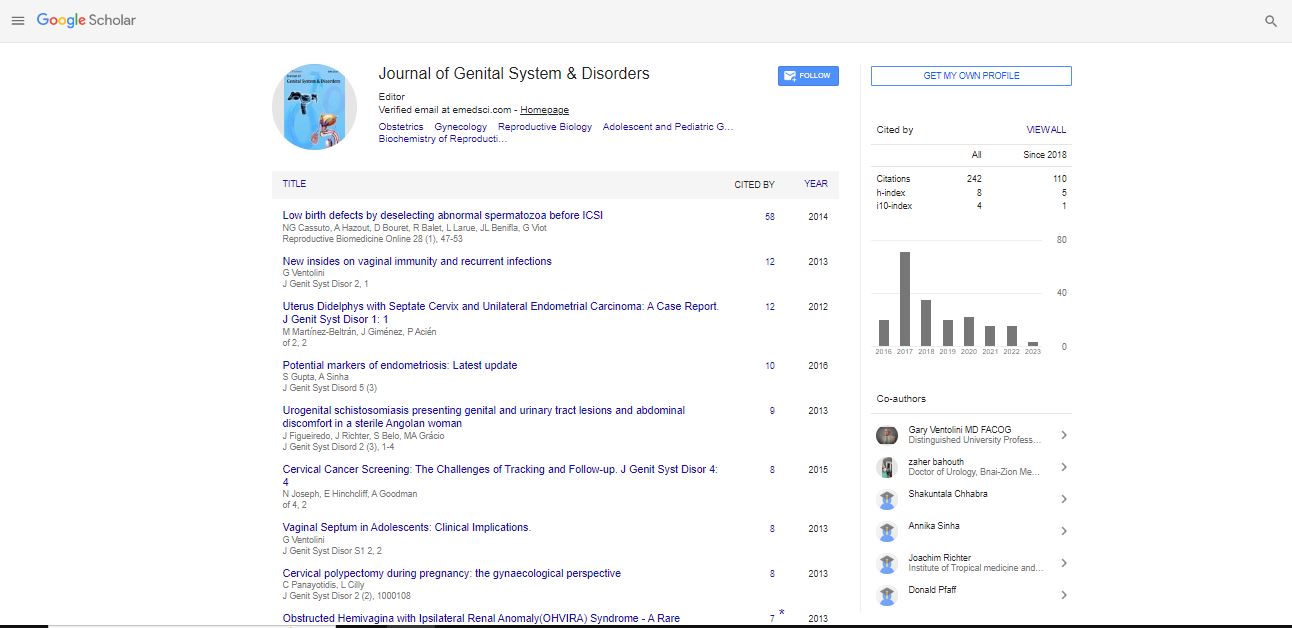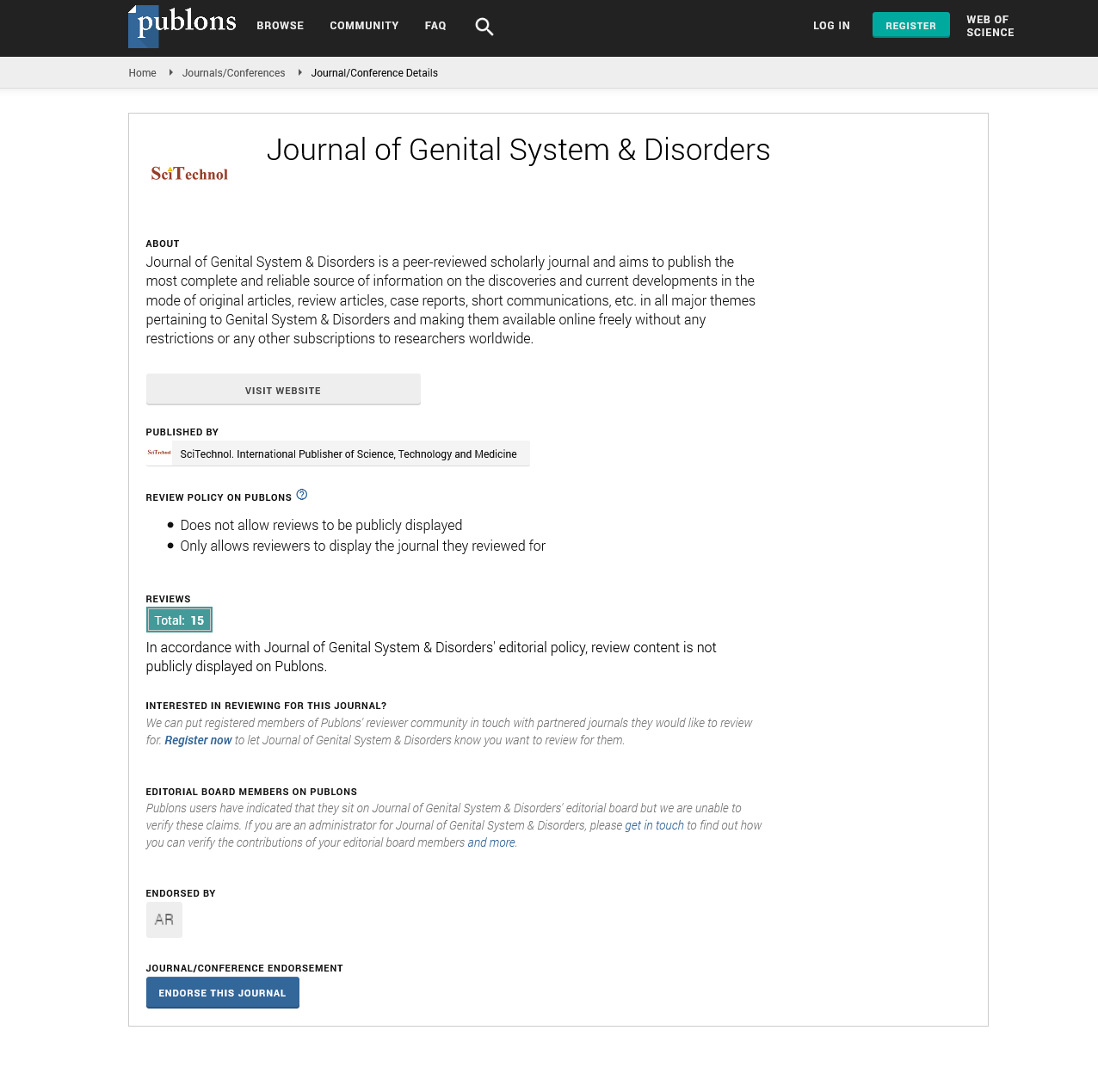Short Communication, J Genit Syst Disord Vol: 12 Issue: 2
Assessing the Causes and Methods for Overcoming Infertility
Clara Jordan*
1Department of Obstetrics and Gynecology, Georgetown University, Washington, USA
*Corresponding Author: Clara Jordan,
Department of Obstetrics and Gynecology,
Georgetown University, Washington, USA
E-mail: Jordan.clara@ucla.edu
Received date: 22 May, 2023, Manuscript No. JGSD-23-107313;
Editor assigned date: 24 May, 2023, PreQC No. JGSD-23-107313 (PQ);
Reviewed date: 08 June, 2023, QC No. JGSD-23-107313;
Revised date: 16 June, 2023, Manuscript No. JGSD-23-107313 (R);
Published date: 26 June, 2023 DOI: 10.4172/2325-9728.1000284
Citation: Clara Jordan (2023) Assessing the Causes and Methods for Overcoming Infertility. J Genit Syst Disord 12:2.
Description
Infertility is a deeply personal and challenging issue affecting millions of couples worldwide. The inability to conceive naturally can be attributed to various factors, both in men and women. Understanding the causes behind infertility and exploring the available methods for overcoming it is essential in helping couples achieve their dream of parenthood. Assessing the causes of infertility includes:
Female factors
Irregular menstrual cycles, Polycystic Ovary Syndrome (PCOS), and diminished ovarian reserve can all contribute to female infertility. Blocked fallopian tubes, uterine fibroids, endometriosis, or abnormalities in the reproductive organs can hinder conception. As a woman ages, her ovarian reserve diminishes, reducing the chances of successful conception.
Male factors
Low sperm count, poor sperm motility, or abnormal morphology can all impact male fertility. Imbalances in testosterone, Follicle- Stimulating Hormone (FSH), or Luteinizing Hormone (LH) can affect sperm production. Conditions like varicocele or obstructions in the reproductive tract can hinder sperm delivery.
Inherited genetic conditions or chromosomal abnormalities can affect both male and female fertility. Factors such as smoking, excessive alcohol consumption, obesity, stress, exposure to certain chemicals or toxins, and poor nutrition can impact fertility for both partners.
Medical history and physical examination
A thorough evaluation of both partners' medical history, including previous pregnancies, surgeries, or medical conditions, is essential. Physical examinations can help identify any obvious abnormalities or signs of infertility [1-3].
Semen analysis is a standard diagnostic test to evaluate sperm quality, including sperm count, motility, and morphology. Additional tests, such as hormonal profiles, may be conducted if necessary. Tracking basal body temperature, hormone level monitoring, or ovulation predictor kits can help determine if ovulation is occurring regularly [4].
Techniques like transvaginal ultrasound, hysterosalpingography, or hysteroscopy can assess the structure of the uterus and fallopian tubes [4]. Blood tests may be conducted to measure hormone levels at specific points in the menstrual cycle. Chromosomal analysis and genetic testing may be recommended to identify any inherited genetic disorders or chromosomal abnormalities [5-7].
Imaging tests like MRI, CT scans, or ultrasound imaging may be used to identify structural abnormalities or conditions like endometriosis
Methods for overcoming infertility
Maintaining a balanced diet rich in fruits, vegetables, whole grains, and lean proteins can promote fertility. Engaging in moderate physical activity helps manage weight, reduce stress, and improve overall reproductive health. Quitting smoking, limiting alcohol consumption, and avoiding recreational drugs can improve fertility prospects.
Medications like Clomiphene citrate or letrozole can stimulate ovulation in women. Hormone supplements can help address hormonal imbalances in both men and women. Procedures like In Vitro Fertilization (IVF) and Intrauterine Insemination (IUI) can help overcome fertility challenges by manipulating the fertilization process.
Hysteroscopy is used to diagnose and treat structural abnormalities in the uterus. Laparoscopy is minimally invasive procedure used to diagnose and treat conditions like endometriosis or ovarian cysts. Varicocelectomy is a surgical correction of varicoceles in men to improve sperm quality [8-10].
In Vitro Fertilization (IVF) involves fertilizing eggs with sperm outside the body and transferring the resulting embryos into the uterus. Intracytoplasmic Sperm Injection (ICSI) is a specialized form of IVF where a single sperm is directly injected into an egg. Donor Conception involves using donated eggs, sperm, or embryos for fertility treatment.
Conclusion
Infertility is a complex issue with various causes that can affect both men and women. Understanding the underlying causes and exploring the available methods for overcoming infertility is important for couples seeking to build their families. With advancements in medical science, a range of treatments and techniques, including lifestyle modifications, medications, hormonal therapy, surgical interventions, and assisted reproductive technologies, gives hope to those facing infertility challenges. By seeking professional guidance, couples can navigate the path toward parenthood, armed with knowledge and options tailored to their specific circumstances.
References
- Victor BP (2002) Preventing congenital anomalies in developing countries. Community Genet 5: 61-69.
[Crossref] [Google Scholar] [Pubmed]
- Taye M, Afework M, Fantaye W, Diro E, Worku A (2018) Factors associated with congenital anomalies in Addis Ababa and the Amhara region, Ethiopia: A case-control study. BMC Pediatr 18: 142.
[Crossref] [Google Scholar] [Pubmed]
- Mekonnen GA, Hordof AG, Kitila TT, Adem S (2020) Modifiable risk factors of congenital malformations in bale zone hospitals, southeast Ethiopia: an unmatched case-control study. BMC Pregnancy and Childbirth 20: 129.
[Crossref] [Google Scholar] [Pubmed]
- Little J, Arslan MT, Mossey PA (2004) Smoking and orofacial clefts. A United Kingdom–based case-control study. Cleft Palate Craniofac J 41: 383-386.
[Crossref] [Google Scholar] [Pubmed]
- Graham TP, Driscoll CDJ, Gersony WM, Newburger JW, et al. (2005) Task Force 2: Congenital heart disease. J Am Coll Cardiol 45: 1326-1333.
[Crossref] [Google Scholar] [Pubmed]
- Naeimeh T, Katayon Y, Nazila N (2010) The Prevalence of congenital malformations and its correlation with consanguineous marriages. Oman Med J 25: 37-40.
[Crossref] [Google Scholar] [Pubmed]
- Alverson CJ, Strickland MJ, Gilboa SM, Correa A. (2011) Maternal smoking and congenital heart defects in the Baltimore-Washington infant study. Pediatrics 127: 647-653.
[Crossref] [Google Scholar] [Pubmed]
- Godwin KA, Sibbald B, Bedard T, Kuzeljevic B, Lowry RB, et al. (2008) Change in frequency of select congenital anomalies since the onset of folic acid fortifications in Canadian birth defect registry. Can J Public Health 99: 271-275.
[Crossref] [Google Scholar] [Pubmed]
- Shaw GM, Quach T, Nelso V, Carmichae SL, Schaffer DM, et al. (2003) Neural tube defects associated with maternal periconceptional dietary intake of simple sugars and glycemic index. Am J Clin Nutr 78: 972–978.
[Crossref] [Google Scholar] [Pubmed]
- Neumann PE, Frankel WN, Letts VA, Coffin JM, Copp AJ, et al (1994). Multifactorial inheritance of neural tube defects: Localization of the major gene and recognition of modifiers in ct mutant mice. Nat Genet 6: 357-362.
[Crossref] [Google Scholar] [Pubmed]
 Spanish
Spanish  Chinese
Chinese  Russian
Russian  German
German  French
French  Japanese
Japanese  Portuguese
Portuguese  Hindi
Hindi 
